The Most Comprehensive Online Guide for Counting in Chinese & Talking About Numbers
Chinese Numbers are one of the first things you’ll study when learning Chinese.
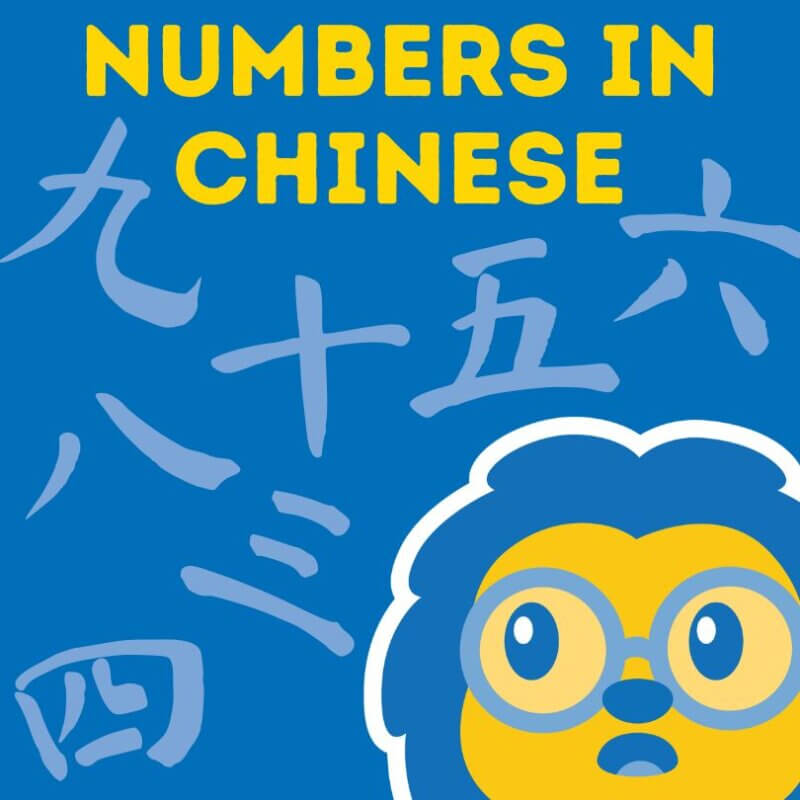
So, we’ve prepared this ultimate guide to Mandarin Chinese numbers which covers numbers in Chinese up to the heady heights of millions and billions.
👉 We’ve even gone as far as to create a quiz for you at the end of this article once you’ve gotten to grips with the numbers!
Also included are important aspects such as saying your age in Chinese, your phone number, and introducing you to the two curious variations of 1 and 2!
Let’s get stuck in!
Chinese Numbers | 0-10
Chinese Numbers | 1-20
Chinese Numbers | 1-100
Chinese Numbers | Chinese Phone Numbers
Chinese Numbers | When Is Your Birthday in Chinese
Chinese Numbers | Your Age in Chinese
Chinese Numbers | Chinese Finger Counting
Chinese Numbers | The Curious Case of Liang
Chinese Numbers | Big Chinese Numbers
Chinese Numbers | How to Pronounce the 0, 1 and 2 in Large Numbers
BONUS: Chinese Numbers Quiz
Chinese Numbers 0-10
When learning Chinese numbers, the first approach is pretty basic:
One horizontal stroke 一 (yī) means 1
Two horizontal strokes, 二 (èr) means 2
And, you guessed it, three strokes, 三 (sān) means 3!


Then, sadly, it’s not as easy as just adding extra lines to keep counting!
From then on, it gets a bit more complex but with a bit of practice, you’ll be there in no time. Let’s take a look at how to count to 10 in Chinese:
| Number | Hanzi | Pinyin |
|---|---|---|
| 0 | 零 / 〇 | Líng |
| 1 | 一 | Yī |
| 2 | 二 | Èr |
| 3 | 三 | Sān |
| 4 | 四 | Sì |
| 5 | 五 | Wǔ |
| 6 | 六 | Liù |
| 7 | 七 | Qī |
| 8 | 八 | Bā |
| 9 | 九 | Jiǔ |
| 10 | 十 | Shí |
Chinese Numbers 1-20
Now we’ve covered up to 10, let’s take it up a notch.
The good news is, once you’ve learned to count to 10 in Chinese, you can actually count all the way up to 99.
That’s because Chinese numbers follow an incredibly logical structure. For example, 11 is 十一 (ten, one) and 12 is 十二 (ten, two) and so on until 19, or 十九 (ten, nine).
This continues into larger numbers, for example:
20 二十 (two, ten)
30 三十 (three, ten)
90 九十 (nine, ten)
To put this theory into practice, let’s first take a look at 11-20 in Chinese:
| Number | Hanzi | Pinyin |
|---|---|---|
| 11 | 十一 | Shí yī |
| 12 | 十二 | Shí èr |
| 13 | 十三 | Shí sān |
| 14 | 十四 | Shí sì |
| 15 | 十五 | Shí wǔ |
| 16 | 十六 | Shí liù |
| 17 | 十七 | Shí qī |
| 18 | 十八 | Shí bā |
| 19 | 十九 | Shí jiǔ |
| 20 | 二十 | Èr shí |
Chinese Numbers 1-100
You’ve now mastered the basics, so from 21-100 it should be pretty straightforward with the same theory applying to every number.
Numbers in Chinese from 21-100 are as follows:
| Number | Hanzi | Pinyin |
|---|---|---|
| 21 | 二十一 | Èr shí yī |
| 22 | 二十二 | Èr shí èr |
| 23 | 二十三 | Èr shí sān |
| 24 | 二十四 | Èr shí sì |
| 25 | 二十五 | Èr shí wǔ |
| 26 | 二十六 | Èr shí liù |
| 27 | 二十七 | Èr shí qī |
| 28 | 二十八 | Èr shí bā |
| 29 | 二十九 | Èr shí jiǔ |
| 30 | 三十 | Sān shí |
| 31 | 三十一 | Sān shí yī |
| 32 | 三十二 | Sān shí èr |
| 33 | 三十三 | Sān shí sān |
| 34 | 三十四 | Sān shí sì |
| 35 | 三十五 | Sān shí wǔ |
| 36 | 三十六 | Sān shí liù |
| 37 | 三十七 | Sān shí qī |
| 38 | 三十八 | Sān shí bā |
| 39 | 三十九 | Sān shí jiǔ |
| 40 | 四十 | Sì shí |
| 41 | 四十一 | Sì shí yī |
| 42 | 四十二 | Sì shí èr |
| 43 | 四十三 | Sì shí sān |
| 44 | 四十四 | Sì shí sì |
| 45 | 四十五 | Sì shí wǔ |
| 46 | 四十六 | Sì shí liù |
| 47 | 四十七 | Sì shí qī |
| 48 | 四十八 | Sì shí bā |
| 49 | 四十九 | Sì shí jiǔ |
| 50 | 五十 | Wǔ shí |
| 51 | 五十一 | Wǔ shí yī |
| 52 | 五十二 | Wǔ shí èr |
| 53 | 五十三 | Wǔ shí sān |
| 54 | 五十四 | Wǔ shí sì |
| 55 | 五十五 | Wǔ shí wǔ |
| 56 | 五十六 | Wǔ shí liù |
| 57 | 五十七 | Wǔ shí qī |
| 58 | 五十八 | Wǔ shí bā |
| 59 | 五十九 | Wǔ shí jiǔ |
| 60 | 六十 | Liù shí |
| 61 | 六十一 | Liù shí yī |
| 62 | 六十二 | Liù shí èr |
| 63 | 六十三 | Liù shí sān |
| 64 | 六十四 | Liù shí sì |
| 65 | 六十五 | Liù shí wǔ |
| 66 | 六十六 | Liù shí liù |
| 67 | 六十七 | Liù shí qī |
| 68 | 六十八 | Liù shí bā |
| 69 | 六十九 | Liù shí jiǔ |
| 70 | 七十 | Qī shí |
| 71 | 七十一 | Qī shí yī |
| 72 | 七十二 | Qī shí èr |
| 73 | 七十三 | Qī shí sān |
| 74 | 七十四 | Qī shí sì |
| 75 | 七十五 | Qī shí wǔ |
| 76 | 七十六 | Qī shí liù |
| 77 | 七十七 | Qī shí qī |
| 78 | 七十八 | Qī shí bā |
| 79 | 七十九 | Qī shí jiǔ |
| 80 | 八十 | Bā shí |
| 81 | 八十一 | Bā shí yī |
| 82 | 八十二 | Bā shí èr |
| 83 | 八十三 | Bā shí sān |
| 84 | 八十四 | Bā shí sì |
| 85 | 八十五 | Bā shí wǔ |
| 86 | 八十六 | Bā shí liù |
| 87 | 八十七 | Bā shí qī |
| 88 | 八十八 | Bā shí bā |
| 89 | 八十九 | Bā shí jiǔ |
| 90 | 九十 | Jiǔ shí |
| 91 | 九十一 | Jiǔ shí yī |
| 92 | 九十二 | Jiǔ shí èr |
| 93 | 九十三 | Jiǔ shí sān |
| 94 | 九十四 | Jiǔ shí sì |
| 95 | 九十五 | Jiǔ shí wǔ |
| 96 | 九十六 | Jiǔ shí liù |
| 97 | 九十七 | Jiǔ shí qī |
| 98 | 九十八 | Jiǔ shí bā |
| 99 | 九十九 | Jiǔ shí jiǔ |
| 100 | 一百 | Yì bǎi |

Chinese Phone Numbers – How to Say Yours
Now you know Chinese numbers from 1-100, saying your phone number should be easy!
One important thing to note:
When referring to phone numbers the Number One is not spoken as Yì 一 but instead Yāo 幺 is used. The general belief is that One and Seven sound similar (yi and qi) when spoken quickly, hence the introduction of Yao.
Therefore if the start of your phone number reads 136 you will say:
Yao San Liu, not Yi San Liu.

In English, we have a habit of sometimes grouping numbers together, such as “Oh Eight Hundred” for 0800 or “Twenty Two, Triple One, Nine” for 221119.
In Mandarin Chinese, this is not the case. All individual numbers are spoken, making it easy to remember.
Let’s practice, take a look at these:
📞13439191994
To say this number we simply say: Yao, San, Si, San, Jiu, Yao, Jiu, Yao, Jiu, Jiu, Si
📞13866889988
If this is your phone number, you are blessed. Why? Take a look at our Chinese Lucky Numbers blog for the answer!
Anyway, the number: Yao, San, Ba, Liu, Liu, Ba, Ba, Jiu, Jiu, Ba, Ba
NOTE: In Taiwan, they do not use this practice of changing ‘yi’ to ‘yao’ and instead just use ‘yi’. Many Taiwanese don’t understand this system and if they do it’s probably because they’ve spent time in Mainland China.
ANOTHER NOTE: These days in China, when you’re making new friends, you probably won’t ask for their number, you’ll most likely ask for their WeChat. Here’s everything you need to know about the platform:
When Is Your Birthday in Chinese
Saying when your birthday is in Chinese is also quite comfortable once you know these key characters/words:
Year
年Pinyin:nián
Meaning: year
Month
月Pinyin: yuè
Meaning: month
Date
日 (formal Chinese)
Pinyin: rì
meaning: date
Date (Oral)
号 (oral Chinese)
Pinyin: hào
meaning: date
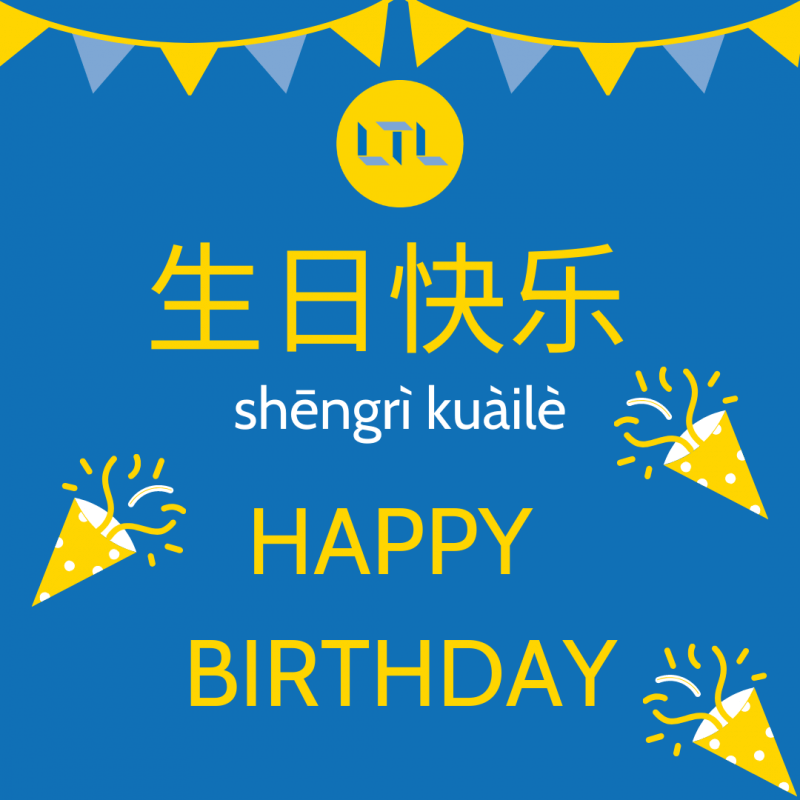
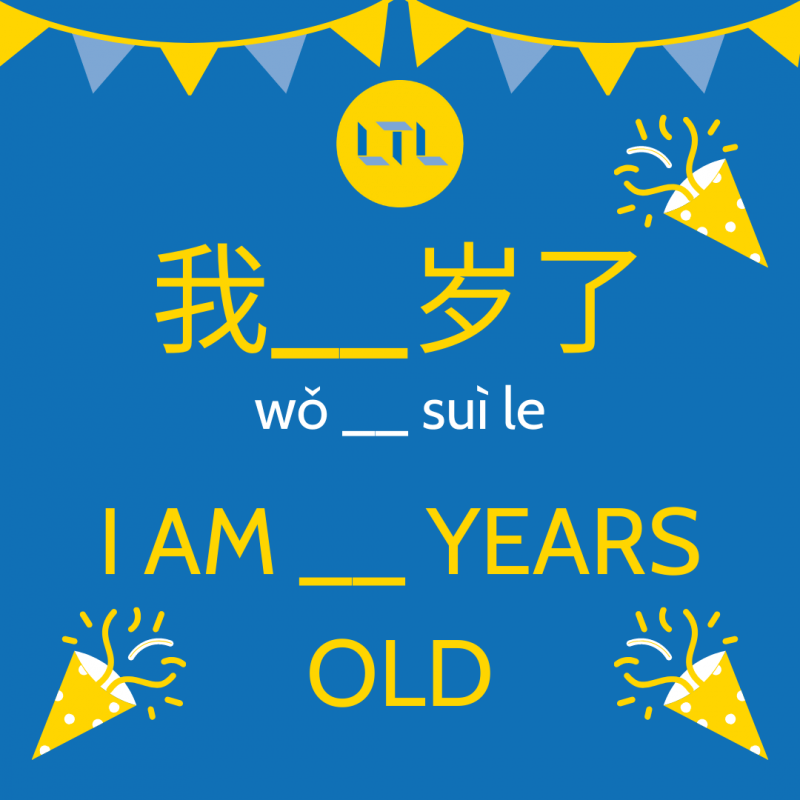
In Chinese the order of speech is Year / Month / Date
For example if your birthday is November 24th 1986, you would say
86年11月24号 (Bāliù nián shíyī yuè èrshísì hào)
If I want to add in the year you can just use the final two numbers of the year.
Easy!

256 Place Names in Chinese 🌏 Rotterdam or Anywhere, Liverpool or Rome…
What are the world’s most famous place names in Chinese? We’ve got a complete list here, 256 to be precise. From Rome to Rio, Japan to Jakarta!
Your Age in Chinese
Once you know the numbers, saying your age will be a piece of cake. Before learning about age, let’s learn some key vocab here:
| Hanzi | Pinyin | English |
|---|---|---|
| 岁 | suì | year; age |
| 几 | jǐ | what number; which number |
| 多 | duō | how much |
| 大 | dà | big; old |
Before telling someone your age you’ll want to wait for them to ask you first! Here’s how to ask age in Chinese:
你多大? nǐ duō dà
你几岁? nǐ jǐ suì
How old are you?
The second question is most likely to be used with children, so we’d recommend you stick with “你多大?”
To respond, you can say:
我___岁 wǒ ___ suì
I am ___ years old
我二十九岁 – Wǒ Èr Shí Jiǔ Suì
I am 29 years old
Chinese Finger Counting
You might be wondering what this chapter is about, but hear us out:
In many cultures, numbers are communicated with a corresponding number of fingers, meaning we can count up to 10 with our hands.
But in China, people can count up to 10 with just one hand!
Every number in Chinese can be communicated by using just one hand!
Want to know the best part?
When you’ve learned them, you will see them everywhere and they are incredibly useful in day-to-day life! Let’s reveal them:
Learn these, and rather than have to shout over the busy crowds, you’ll be able to communicate from afar with these useful hand gestures in Mandarin Chinese!
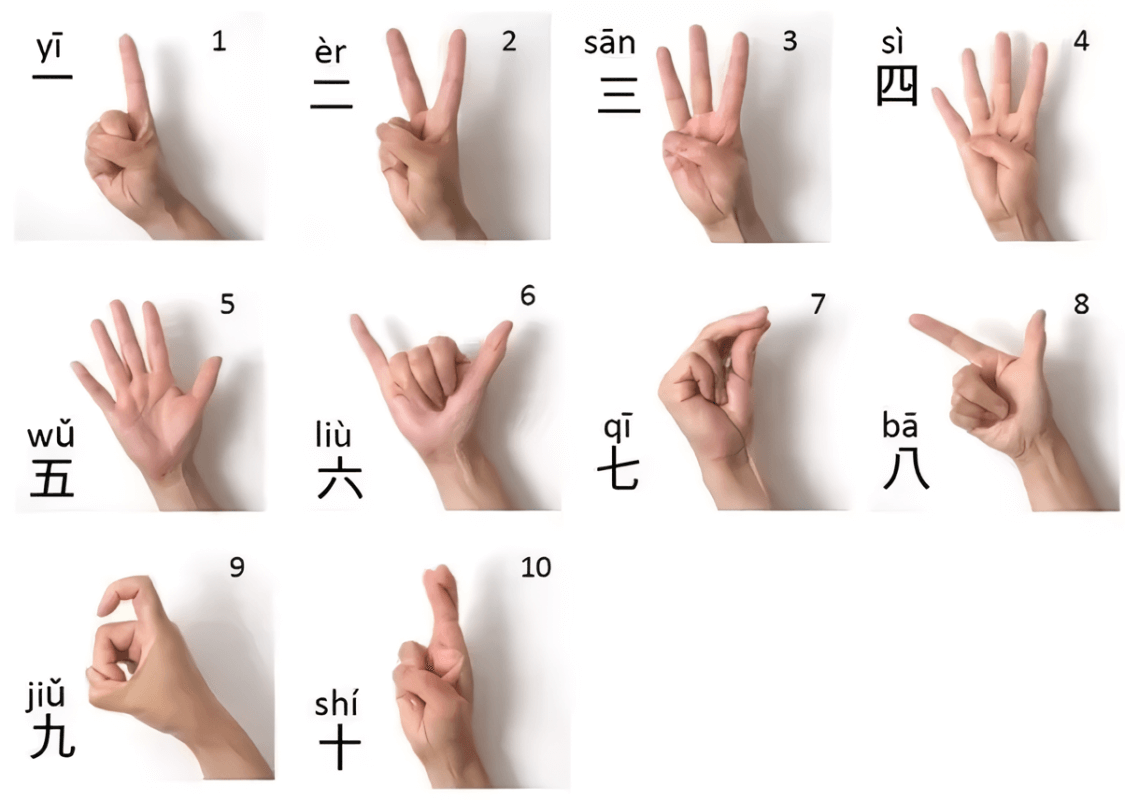
The Curious Case of Liang 两

We touched on how ‘one’ can be spoken in two ways earlier. Well, the same applies to two!
It’s not so complex though, remember in English we also use ‘nought’ and ‘zero’ for 0.
Two is 二 (èr) in Chinese but in certain situations this switches to 两 (liǎng).
Here are a couple of those reasons:
-
两
(liǎng) is used when counting people or things
- 两个人(liǎng gè rén) is two people
- 两 is also used as the first digit in two hundred (两百), two thousand (两千)
- Note for 221, only the first digit is changed to liǎng meaning 221 reads Liang Bai Er Shi Yi
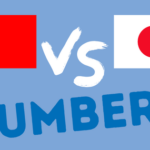
Chinese Vs Japanese // Counting and Numbers (What’s The Story?)
Are Chinese and Japanese Numbers the same? This article might surprise you. We focus on Chinese Numbers vs Japanese Numbers and debunk some myths.
QUICK TIP – Another great way to learn Chinese is through music… which music you ask? We got your back!
BONUS – Big Chinese Numbers
Beyond the number 99, when counting in Chinese, you need to use characters that represent hundreds, thousands, tens of thousands, etc… as this might seem confusing.
Because of this, we have a couple of tricks for counting BIG CHINESE NUMBERS!
Firstly, check out our simple How-To video series to find out how to say the biggest numbers in Chinese!
#1 Trick for Counting in Chinese
The first trick to learn Chinese numbers quickly is to change the way you consider them
EASY – When we write the number 23 二十 三 (èr shí sān) in Chinese, for example, we literally have a 2-10-3.
It’s pretty straighforward understand, but, if you consider 10 十 (shí) as a “measure word for tens”, learning Chinese numbers over hundreds and thousands gets much easier indeed.
In fact, if you stick to this line of thinking, you consider:
百 (bǎi) as a “measure word” for hundreds
Example: 999 = 九百 九 十九 – 9 hundreds – 9 tens – 9 (units)
千 (qiān) as a “measure word” for thousands

Example. 9999 = 九千 九百 九 十九 – 9 thousand – 9 hundreds – 9 tens – 9 (units)
Eventually, we could now add the character 万 wàn to this series of “numeral measure words” to be able to read most of the numbers that you commonly see newspapers, TV, etc.
So, let’s consider…
万 (wàn) as a”measure word” for tens of thousands
Example. 99999 = 九万 九千 九百 九 十九 – 9 tens of thousands – 9 thousand – 9 hundreds – 9 tens – 9 (units)
Learning the sequence from thousands 千, hundreds 百, to tens 十 and units (simple numbers) should make it easier for you to read numbers beyond tens of thousands.
Generally, when teachers start to explain how to count beyond 10000, many of those students who have decided to study a foreign language to stay away from numbers start to feel dismayed. But … here comes our magic ….
#2 Trick for Counting in Chinese
Why don’t Chinese people directly count from thousands to millions just like Westerners do? The answer to this question is the key to read all kinds of numbers in Chinese!
For the ease of the reader, when writing big numbers, Westerners normally separate them with a comma, in groups of 3 digits, from right to left (eg 99,999).
When counting in Chinese, numbers are generally separated (from right to left) in groups of 4 digits: 99,999 ⇒ 9,9999
All that clear?
To sum up, when counting big numbers in Chinese, it would be better to separate them into groups of 4 digits and to keep in mind that each group of 4 contains the sequence “千 – 百 – 十 – unit” (thousands-hundreds-tens-units).
Now that you know the 3 characters needed to count up to 10,000, one last little effort is needed:
You only need to learn 2 more characters in order to be able to read numbers up to the trillions in Chinese.
Oh yes, only 2 more characters are needed!
亿 (yì) “measure word” for hundreds of millions
兆 (zhào) “measure word” for trillion.

If the explanation you had in class about “Counting beyond 10,000 in Chinese” seemed way more complicated than this, remember that it is only a matter of perspectives.
Once you divide a big number into groups of 4 digits with a comma, all you have to do is to replace every comma you added with the relative “numeral measure word” and you’re done!
For example, if we take this number – 9,999,999,999,999
(nine trillion nine hundred ninety-nine billion nine hundred ninety-nine million nine hundred ninety-nine thousand nine hundred ninety-nine)
According to the Chinese way it will be divided as follows
9,9999,9999,9999
As we learned, you should read every 4-digit group as 9999 九千 九百九十九 (Jiǔqiān jiǔbǎi jiǔshí jiǔ). The only and last thing you need to do now is to replace our so-called “numeral measure word” with commas, as follows:
9 兆 9 亿 9 万
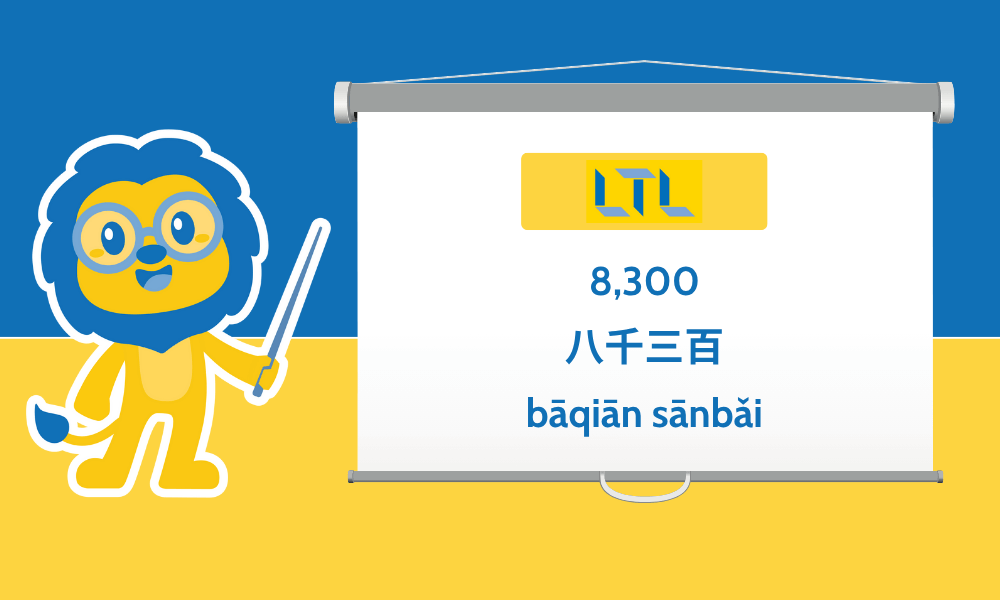
And now, from left to right we will read:
九兆 九千九百九十九亿九千九百九十九万九千九百九十九
This reads – Jiǔ zhào jiǔqiān jiǔbǎi jiǔshíjiǔ yì jiǔqiān jiǔbǎi jiǔshíjiǔ wàn jiǔqiān jiǔbǎi jiǔshíjiǔ
Not so bad right…?!
How to Pronounce the Digits 0, 1 and 2 in Large Numbers?
When studying the Chinese numbers, one of the first characters you learn is 零 líng (zero). Everything seems super easy with it until you learn big numbers in Chinese and you start doubting about whether to pronounce it or not.

There are 3 simple rules to pronounce the digit zero in big numbers so… let’s study them all!
REMEMBER – As you already learned above, the easiest way for counting in Chinese is to divide big numbers into groups of 4 digits and to match each digit the corresponding “numeral measure word” (千 for thousands,百 for hundreds, 十for tens, and nothing for units).
When there is one or more 0 in a group of 4 digits, all you have to keep in mind are these 3 simple rules:
- 1) Do not pronounce the “numeral measure word” when it corresponds to 0
3,038 = 三千零三十八 sānqiān líng sānshíbā (as 百 corresponds to 0, there’s no need to pronounce it).
308三百零八 sānbǎi líng bā (as 十 corresponds to 0 there’s no need to pronounce it).
- 2) Pronounce just one zero when there is more than one 0 in a group of 4 digits
00 = 零零 => 零
3,008三千零八 sānqiān líng bā
- 3) Do not pronounce 0 (or a group of 0) when it is at the end of a number (just ignore the 0)
8,000 八千 bāqiān
8,300 八千三百 bāqiān sānbǎi
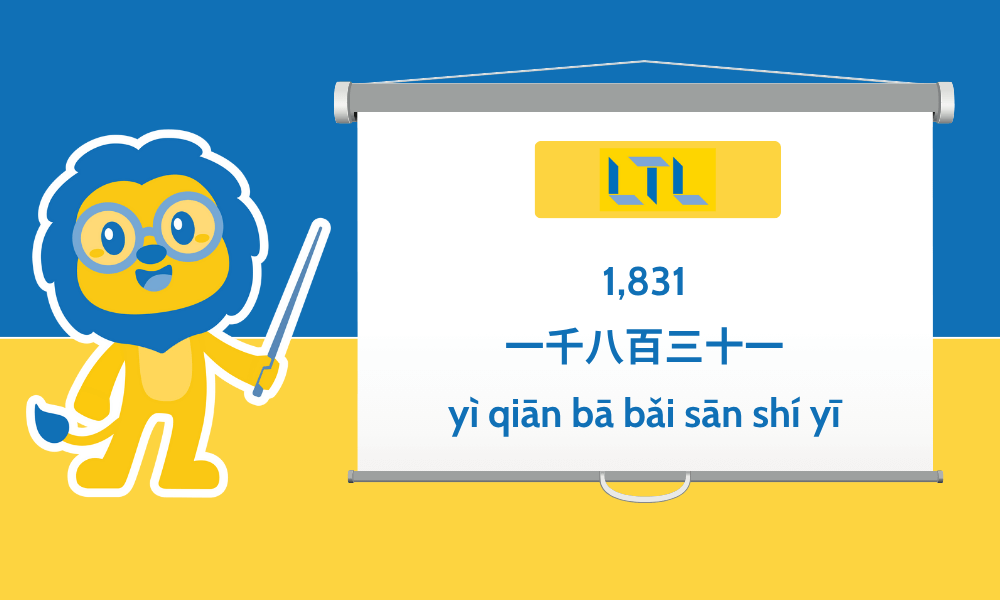
800 八百 bābǎi
830 八百三十 bābǎi sānshí
80 八十 bāshí
BONUS – did you know Chinese use numbers for slang also! Check it out… find out and download the 2nd image on our Chinese slang blog linked below!

How to Pronounce the Digit 1 in Large Numbers?
As the easiest Chinese character to draw, the number one “一” (yī) is also very easy to use.
What many Chinese students don’t know, is that the pronunciation of the character 一 may vary from yī to yì according to its position in a number.
Therefore, there are two rules to keep in mind:
- When 1 is in the position of thousands or hundreds it is pronounced as yì, when in tens or units it is pronounced as yī
1,111 | 一千一百一十一 ( yì qiān yì bǎi yī shí yī )
1,831 | 一千八百三十一 ( yì qiān bā bǎi sān shí yī )

- When 1 is in numbers from 10 to 19, you just consider it as a ten so you pronounce it as 十 shí:
You just say 十 10 (shí), 十一 11 (shíyī), 十二 12 (shíèr) … etc.
How to Pronounce the Digit 2 in Large Numbers?
As you know, the digit 2 has two different pronunciations in Chinese:it can be pronounced as 二 (èr) or as 两 (liǎng).
QUESTION – How to distinguish when to pronounce 2 as 二èr or as 两liǎng in big numbers?
When 2 is in the position of thousands or hundreds it is pronounced as 两 liǎng, when it is in tens or units it is pronounced as 二 èr.
2,222 =两千两百二十二
Concluding Big Chinese Numbers
In conclusion, by dividing big numbers into groups of 4 digits (from right to left) and replacing each comma with the relative “numeral measure word” – from right to left, 万 (wàn), 亿 (yì) and 兆 (zhào) – we will be able to read any number in Chinese up to billions.
Chinese Numbers Quiz
How well do you know the numbers in Chinese?
Let’s find out! Take our little quiz below, and you’ll receive the answers immediately.
Further Reading
We’ve always got more.
No one does content about China quite like we do so here are some others we think you’ll like:
- We’ve done numbers but what about the alphabet? We’ve covered pretty much every question we’ve ever been asked about the Chinese Alphabet and the characters.
- We mentioned them above but in case you missed it Chinese Lucky Numbers is quite a thing here.
- Want to level up your Maths skills in Chinese? Look no further than our guide to Maths in Chinese.
- Studying Japanese and Chinese together? You might like our look at Japanese and Chinese Numbers too.
You an even learn Chinese online with LTL to get your journey kick-started.
Drop us a comment below if you have any feedback on learning Chinese numbers whether you are a beginner, intermediate or advanced learner of Chinese.
OR if you fancy putting yourself to the test further, why not check out our guides on:
👉 The grammatically challenging Russian numbers
👉 or even discover the wonderful world of Vietnamese numbers!
Thanks for reading!
Chinese Numbers || FAQs
Does “Yāo 幺” mean 1 in Chinese?
Number 1 in Chinese is Yì 一.
However, when referring to phone numbers the Number One is not spoken as Yì 一 but instead Yāo 幺 is used. This is because 1 and 7 are widely regarded to sound too similar and could therefore cause confusion.
Is two in Chinese Er 二 or Liang 两?
Two is Er 二 in Chinese but in certain situations this switches to Liang 两.
Er 二 is used generally when counting in numbers or performing mathematical functions. Liang 两 is used to say two of or a pair of something.
When ordering in a restaurant should I ask for Er 二 or Liang 两 when ordering two of something?
When getting your head around the Chinese menus, remember to use Liang 两 when ordering two of something.
Although the waiter/waitress would understand if you said Er 二个, it is grammatically incorrect.
If I learn the numbers in Chinese, can I tell the time?
Yes pretty much. Telling the time in Chinese is easy once you learn the numbers from 1-12, as with most languages. Is all you need to do is add 点 after the number to make “O’Clock”…
For example, 3 O’Clock would read 三(3)点. Simple!
When counting big numbers does Chinese use a comma after 3 zeros as well?
No, Chinese uses a comma after every 4 zero’s. Take the following:
In English 10000 would become 10,000 with a comma (effectively 10 one thousands).
In Chinese 10000 would become 1,0000 with a comma (effectively 1 ten thousand).
This is because Chinese has a word for ten thousand which is 万 Wàn, so rather than say ten thousands (十千) which doesn’t exist in Chinese, we say 一万.
Why is 250 avoided in Chinese?
By saying the number 250 you are actually insulting someone by calling them an idiot.
Due to this, China avoids the number 250 at all costs, that includes prices in supermarkets as well!
On the contrary, here is a list of the most lucky numbers in Chinese culture.
What does 520 mean in Chinese slang?
520 in Chinese slang actually means I Love You in Chinese. This is because the sound of the numbers 5, 2 and 0 sound very similar to the way to say I Love You in Chinese!
How do you say 1, 2, 3 in Chinese?
Three of the easiest Chinese characters to remember. 1, 2, 3 in Chinese is 一 (yī) means 1, 2 is 二 (èr), and 3 is 三 (sān).
How can I talk about math in Chinese?
We wrote a blog relating to mathematical terms in Chinese which will help you learn all about Maths in Chinese here.
Want more from LTL?
If you wish to hear more from LTL Language School why not join our mailing list.
We give plenty of handy information on learning Chinese, useful apps to learn the language and everything going on at our LTL schools!
Sign up below and become part of our ever growing community!
BONUS | Want to study the local Taiwanese dialect known as Hokkien? We provide Hokkien classes in person and online.
⭐ Download our free ebook, your starter pack of essential Mandarin learning resources!


 Hi, my name is Greta. I am from Italy and I work as a student advisor at our Taipei school.
Hi, my name is Greta. I am from Italy and I work as a student advisor at our Taipei school. Hi, my name is Manuel! I am from Spain and I am a Student Advisor at LTL. I’m now based at our Seoul School after living 3 years in Taipei.
Hi, my name is Manuel! I am from Spain and I am a Student Advisor at LTL. I’m now based at our Seoul School after living 3 years in Taipei.






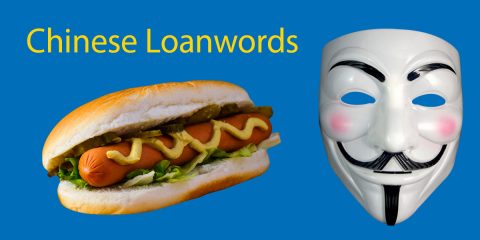
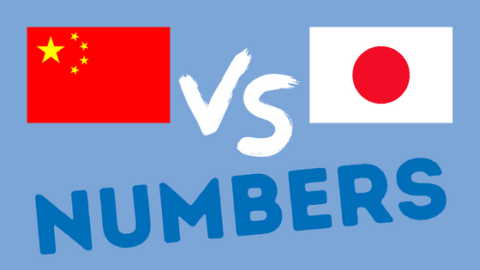
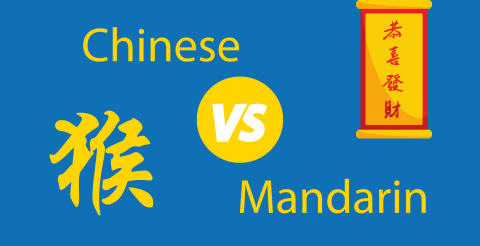
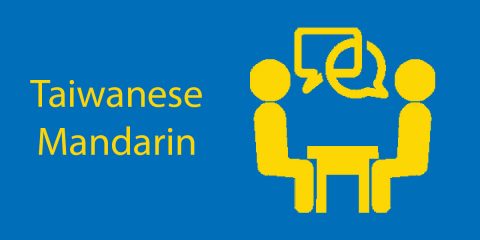


46 comments
[…] Number – 数 Shù […]
Hey LTL, really like the post and learnt a lot about Numbers.
The videos were super useful, thanks
John
Am happy that am getting it all right because of your wonderful teaching
Super happy to hear that
Hi John, Really appreciate the comments. Plenty more videos to come via our YouTube Channel here >>> https://www.youtube.com/LTLMandarinSchool
Thank you for the nice explanations. I would like to add one in America we do this:
American counting system: 1万 = 10,000 1亿 = 100,000,000 = 100 Millions = 0.1 Billions 1兆 = 1,000,000,000,000 = 1 Trillion (not 1 Billion)
Thanks for your feedback 唐龙
Numbers are an interesting element to learn in Chinese. They open so many doors!
LTL Team
thank you
[…] 千 is a fairly common character which appears in numbers, since it means “thousand”. […]
[…] Want to go all the way to a million? Listen to all the numbers […]
xiexie谢谢
不用谢
Fantastic article, thorough and comprehensive. Shared.
Thank you
Thanks so much Jess, it took some time, but well worth it!!
[…] Chinese Numbers – The Ultimate Guide […]
I really like this post. Thank you LTL
Our pleasure Alex!
Negative numbers?
thx for this it helps
Our pleasure Emma 🙂
Glad you found it useful.
I've just Signed up today 8/1/25 Beginner
Let's do this!
[…] ltl-taiwan […]
This is so so useful!! Thanks Max
Really pleased to hear it Samri, our pleasure!
Absolutely superb article LTl!
Super kind thanks Vlacek
I love this guide, thanks also for making videos
Our pleasure Lisa
Just to add that your mileage will vary in Taiwan. The hand symbols are different for numbers and people will still say Yi instead of Yao for the number 1.
Absolutely, thanks for the comment Casey.
[…] there is symbolism attached to the amount of money you give – in the north of China, for example, whole numbers are […]
[…] is a website that explains counting and numbers in Chinese from a westerner’s perspective. It is a good […]
Xiexie ni
不用谢 Hafsa
[…] in Mandarin (under 10,000 [see the section below on big numbers]) is fairly simple. There are a few rules having to do with zero that might take a little effort to memorize, but other than that, small […]
Very good guide. love it
Many thanks Leigh!
[…] will be used. The article quoted from above seems to suggest Cantonese numbers are quicker than Mandarin. These may prove a good place to start for Diinlang. Some Chinese number names are renamed for […]
[…] Chinese Numbers | The Ultimate Guide (PLUS Free Quiz Inside) […]
very interesting and helpful indeed, confusion still there about use of zero...
[…] https://ltl-taiwan.com/chinese-numbers/ […]
This is very helpful, but the error in the following paragraph made me giggle. You may want to fix it so it reads billions not billiards. 😀
Concluding Big Chinese Numbers In conclusion, by dividing big numbers into groups of 4 digits (from right to left) and replacing each comma with the relative “numeral measure word” – from right to left, 万 (wàn), 亿 (yì) and 兆 (zhào) – we will be able to read any number in Chinese up to billiards.
Haha very good typo that! We've promptly edited. Thanks Caete, glad it raised a smile 🙂
[…] here and/or here to read how to say phone numbers in English (basically, it’s the same as normal […]
[…] That’s your first essential word! But before we delve deeper, it’s crucial to have a grasp of Chinese numbers. […]